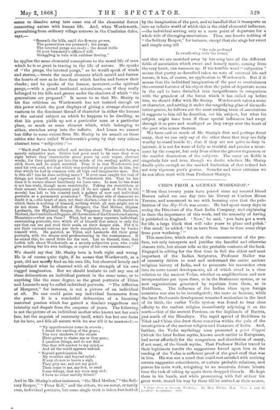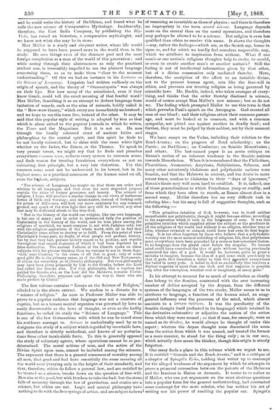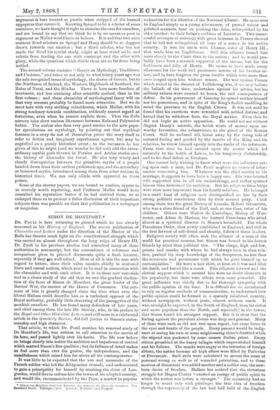CHIPS FROM A. GERMAN WORKSHOP.* " MORE than twenty years
have passed since my revered friend Bunsen called me one day into his library at Carlton House Terrace, and announced to me with beaming eyes that the pub- lication of the Rig-Veda was secure. He had spent many days in seeing the Directors of the East India Company, and explaining- to them the importance of this work, and the necessity of having it published in England. ' Now,' he said, ' you have got a work for life, a large block that will take years to plane and polish' ' But mind,' he added, ' let us have from time to time some chips from your workshop.' " This anecdote, which stands at the commencement of the pre- face, not only interprets and justifies the fanciful and otherwise obscure title, but almost tells us the probable contents of the book. Engaged in editing for the first time in full the oldest and most important of the Indian Scriptures, Professor Muller was of necessity driven to read and understand the entire ancient religious history of India, and to prosecute his researches even into its more recent developments, all of which stood in a close relation to the ancient Vedas, whether as amplifications and new interpretations put upon them, as in the Brahmanic system, or as new organizations generated by repulsion from them, as in Buddhism. The influence of the Indian ideas upon foreign countries was also to be investigated ; the more so because, while the later Brahmanic development remained motionless in the land of its birth, the earlier Vedic system was found to bear close affinity to the earliest religion immediately adjoining it on the north—that of the ancient Persians, on the highlands of Bactria, just north of the Himalaya. The rapid spread of Buddhism to Tibet and China also drew those countries within the pale of the investigation of the ancient religion and literature of India. And, further, the Vedic mythology soon presented a point dappui (which the later Indian myths, known much earlier to Europeans, had never afforded) for the comparison and elucidation of many, if not most, of the Greek myths. That Professor Muller traced to their legitimate results the suggestions forced upon him in the reading of the Vedas is sufficient proof of the good stuff that was in him. His was not a mind that could rest satisfied with noticing certain suggestive coincidences, or certain probable relations, and pursue his main work, relegating to an uncertain future leisure time the task of taking up again these dropped threads. He kept them in his hands, and while prosecuting with full ardour his great work, traced his way by them till he arrived at their source,
Chips from a German Workshop. By Max Miller, M.A. V(IiS. L and II, London : Lungrnans. 1567. and he could write the history of Buddhism, and found what he calls the new science of Comparative Mythology. Incidentally, therefore, the East India Company, by publishing the Rig- Veda, has raised an historian, a comparative mythologist, and
we know not what else may be in store.
Max Muller is a ready asd eloquent writer, whose life would be supposed to have been passed more in the world than in the study. He sees things even of the dimmest past and the most foreign complexion as a man of the world of this generation ; and while seeing through their abstruseness as only the practised student can, is irresistibly impelled to use the plainest language
concerning them, so as to make them " clear to the meanest understanding." Of this we had an instance in his Lectures on the Science of Language. Linguists had written endlessly on the
origin of speech, and the theory of " Onomatopoeia" was always on their lips. But how many of the uninitiated, even if they knew Greek, could tell the exact meaning of that fearful word ? Max Muller, describing it as an attempt to deduce language from imitation of sounds, such as the cries of animals, boldly called it the " Bow-wow theory," which every one immediately understood ;
and we hope to see this term live, instead of the other. It may be said that this popular style of writing is adopted by him as that which is alone suited to the popular journals in which he writes, the Times and the Magazines. But it is not so. He sees through the locally coloured crust of ancient faiths and philosophies to the central spirit, and this spirit he finds to be not locally coloured, but to shine with the same white light whether on the Indus, the Limns, or the Thames. To speak in very prosaic terms, we might say that he finds and preaches everywhere common sense, reduces every system to common sense, .and finds reason for treating fanaticism everywhere as not an animating first principle, but a very late distortion. Yet this common sense must not be understood in its lowest, but in its
'highest sense, as a practical consensus of the human mind on all, even the highest, subjects.
"The science of Language has taught us that there are order and wisdom in all languages, and that even the most degraded jargons contain the ruins of former greatness and beauty. The science of religion, I hope, will produce a similar change in our views of barbarous forms of faith and worship ; and missionaries, instead of looking only for points of difference, will look out more anxiously for any common ground, any spark of the true light that may still be revived, any altar that may be dedicated afresh to the true God.
"But in the history of the world our religion, like our own language, is but one of many ; and in order to understand fully the position of Christianity in the history of the world, and its true place among the religions of mankind, we must compare it, not with Judaism only, but with the religious aspirations of the whole world, with all in fact that, Christianity came either to destroy or to fulfil. From this point of view Christianity forms part, no doubt, of what people call profane history, but by that very fact, profane history ceases to be profane, and regains throughout that sacred character of which it had been deprived by a false distinction. The ancient Fathers of the Church spoke on these subjects with far greater freedom than we venture to use in these days.
• God,' says Clement, is the cause of all that is good : only of some good gifts He is the primary cause, as of the Old and New Testaments, of others the secondary, as of (Greek) philosophy. Bat even philosophy may have been given primarily by him to the Greeks, before the Lord had called the Greeks also. For that philosophy, like a teacher, has guided the Greeks also, as the Law did the Hebrews, towards Christ. Philosophy, therefore, prepares and opens the way to those who are made perfect by Christ.'"
The first volume contains " Essays on the Science of Religion," alluded to in the above extract. We confess to a distaste for a " science of religion." As soon as Professor Muller was able to
prove to a popular audience that language was not a creature of -caprice, but as a human mental organism was governed by laws as easily discoverable as the laws of thought, or even as the bodily
functions, he called its study the " Science of Language." This is one of the few Germanisms with which he can be taxed since
his residence amongst us. Science is undoubtedly used by us to designate the study of a subject which is guided by invariable laws,
and therefore is strictly methodical, and knows of no perturba- tions from other incalculable force. To this is generally opposed the study of voluntary agents, whose operations cannot be so pre- -determined. The moral actions of man, and the action of the Divine Spirit upon man, cannot be included among the sciences. The argument that there is a general consensus of morality among all men, that good and bad have essentially the same meaning all the world over (varying only in the height of their standard), and that, therefore, ethics do follow a general law, and are entitled to be treated as a science, breaks down on the question of free-will. Men aim at the good, but with freedom to take the bad ; but the stone falls of necessity through the law of gravitation, and statics are a science, but ethics are not. Logic and mental philosophy have nothing to do with the free springs of action, and are subject to laws
of reasoning as invariable as those of physics ; and there is therefore no impropriety in the term mental- science. Language depends more on the mental than on the moral operations, and therefore may perhaps be allowed to be a science. But religion is even less qualified than ethics to receive this name. It shows the thoughts —nay, rather the feelings—which are, as the Scotch say, borne in upon us, and for which we hardly feel ourselves responsible, nay, which we attribute to inspiration from without. What if one man's or one nation's religious thoughts help to evoke, to mould, or even to create another man's or another nation's? Still the feeling is not of intellectual information given by that other, but of a divine communion only mediated thereby-. Here, therefore, the ascription of the effect to an invisible divine, not to the present human agent, acts like the free-will in ethics, and prevents our treating religion as being governed by scientific laws. Mr. Buckle, indeed, who takes averages of every- thing, and thinks that the order thereby disclosed is science, would of course accept Max Muller's new science ; but so do not we. The feeling which prompted Miiller to use this term is that which pervades Paul's speech on the Areopagus. God created all men of one blood ; and their religions attest their common parent- age, and must be looked at in common, and with a common sympathy, not pitted one against another in deadly feud ; and further, they must be judged by their noblest, not by their meanest stages.
We have essays on the Vedas, including their relation to the Zend-Avesta ; on the progress of Zend scholarship ; on the Parsis ; on Buddhism ; on Confucius ; on Semitic Monotheism ; and others. The last-named paper is an acute critique on Renan's notion of an inherent tendency in the Semitic nations towards Monotheism. When it is remembered that the Philistines, Phceuicians, Ammonites, Assyrians, Babylonians, Sabeans, and many other notoriously idolatrous and polytheistic nations were Semitic, and that the Hebrews in ancient, and the Arabs in more recent times, confess to idolatries in their " days of ignorance," Renan's thesis may well seem hard to establish. It is, indeed, one of those generalizations to which Frenchmen jump so readily, and from which they have often to recede, as Renan almost does in a second essay. Muller therefore has no very difficult task in refuting him ; but his essay is full of suggestive thoughts, such as the following :— " This primitive intuition of God, however, was in itself neither monotheistic nor polytheistic, though it might become either, according to the expression which it took in the languages of men. It was this primitive intuition which supplied either the subject or the predicate in all the religions of the world, and without it no religion, whether true or false, whether revealed or natural, could have had even its first begin- ning. It is too often forgotten by those who believe that a polytheistic worship was the most natural unfolding of religious life, that polytheism must everywhere have been preceded by a more or less conscious theism. In no language does the plural exist before the singular. No human mind could have conceived the idea of gods without having previously conceived the idea of a god. It would be, however, quite as great a mistake to imagine, because the idea of a god must exist previously to that of gods, that therefore a belief in One God weeded everywhere the belief in many gods. A belief in God as exclusively One involves a distinct negation of more than one God, and that negation is possible only after the conception, whether real or imaginary, of many gods."
In his attempt to account for so much of monotheism as clearly does belong to the Semites, contrasted with the ever increasing number of deities accepted by the Aryans, from the different systems of the languages of the two stocks, Muller seems to us to attribute to language, a function of the human mind, an exag- gerated influence over the processes of the mind, which almost amounts to a rtrepol, vparipmi. It was the peculiarity of the Semitic thought itself (reflected in its language) which retained in the derivative substantive or adjective the notion of the action from which they were named ; so that if man, for example, were so named as the thinker, he would always be thought of under this aspect ; whereas the Aryan thought soon dissociated the noun from the action from which it was named, and treated the former as a mere counter, to stand for the thing only ; as in our man, which actually does mean the thinker, though this origin is utterly forgotten.
One essay finds a place in this volume which we regret to see. It is entitled " Genesis and the Zend-Avesta," and is a critique of a chapter of Spiegel's Fran, holding that writer up to contempt for the alleged weakness of the argument by which he attempts to prove a primeval connection between the parents of the Hebrews and the Iranians in Haran or Armenia. It seems to us rather as if Muller, who can put arguments on the most abstruse questions into a popular form for the general understanding, had contracted some contempt for the mere scholar, who has neither his art of writing nor his power of reaching the popular ear. Spiegel's argument is here treated as puerile when stripped of the learned apparatus that covers it. Knowing Spiegel to be a scholar of some eminence, we have thought it right to examine the case for ourselves, and are bound to say that we think he is by no means so poor in argument as Willer would have us believe. It is sad that two such eminent Zend scholars as Spiegel and Haug should be at daggers drawn towards one another ; but a third scholar, who has not made the Zend his special study, might at least stand aside, and refrain from loading the one with contempt and the other with glory, while the questions which divide them are so far from being settled.
The second volume contains " Essays on Mythology, Traditions, and Customs," and takes us not only to what thirty years ago was the sole recognized home of mythology, the shores of Greece, but to the Northmeu of Ireland, the Western Highlands of Scotland, the Zulus of Natal, and the Hindus. There is here more freedom of treatment, and less straining after scientific method, than in the first volume ; and these chronicles of mythological fancy will on that very account probably be found more attractive. But we do meet here with very striking coincidences, which Muller, with his strong tendency towards combination, evidently cannot regard as fortuitous, even when he cannot explain them. Thus the Zulu nursery tales show curious likenesses between Zulu and Polynesian habits. The author also does very good service to the now popu- lar speculations on mythology, by pointing out that mythical features in a story do not of themselves prove the story itself to refer to deities and imaginary superhuman agents, but may be engrafted on a purely historical event ; to the instances he has given of this he might (and we wonder he did not) add the extra- ordinary mythic garb thrown in Persian and Arabic stories over the history of Alexander the Great. He also very wisely and clearly distinguishes between the primitive myths of a people handed down from their earliest prehistoric age, and the secondary or borrowed myths, introduced among them from other nations in historical times. We can only allude with approval to- these points.
Some of the shorter papers, we are bound to confess, appear to us scarcely worth reprinting, and Professor Muller would have consulted his reputation better if he had omitted them, or so enlarged them as to present a fuller discussion of their important subjects than was possible on their first publication in a newspaper or magazine.




































 Previous page
Previous page